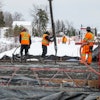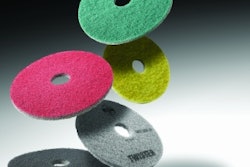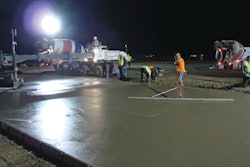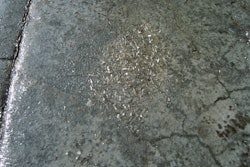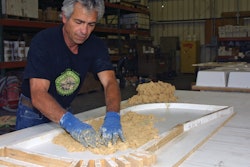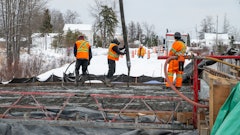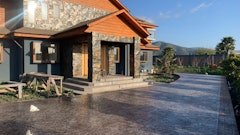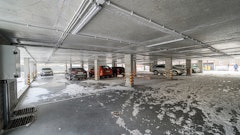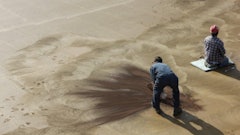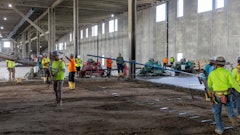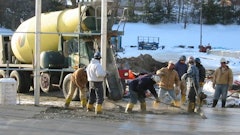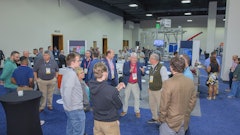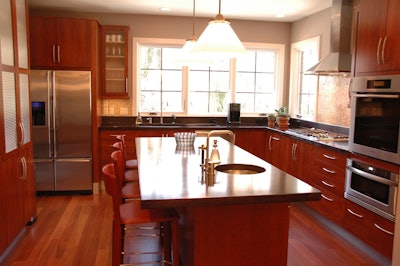
"Are those countertops granite?"
"No, they are concrete."
"Really? How much do they cost?"
"Starts at about $100 per square foot."
"WHAT!!??"
This is a not an uncommon dialogue when delivering concrete countertops to a jobsite. The concrete contractor on site hears these countertops are made out of the same material they work with everyday, but the price these countertops command is 10 or 20 times higher than the work they are doing. A few hours on the Internet, a quick trip to the sign shop, and the truck for the concrete contractor shows off their newest offering—"Driveways, Stamped Concrete, and CONCRETE COUNTERTOPS!"
A few months later, that promotional magnet affixed to the contractor's truck has found its way to the dumpster. After seeing this scenario play itself out over and over, it begs the question—What keeps that magnet out of the dumpster? What does it take to make a successful business creating artisan concrete?
Concrete is a paradox at every turn. It is the most widely consumed material on the planet next to water; yet ask any person on the street “What is concrete?” and you are likely to get an impressively wide range of wrong or incomplete answers.
Concrete is responsible for the infrastructure that holds up modern civilization, considered ‘indestructible’, yet concrete is brittle and it cracks.
Concrete is used in the largest buildings and public works projects in the world, yet it is also used to make incredibly delicate and beautiful jewelry.
This paradox shows itself when we ask what is the common thread among people who build things out of concrete. Concrete is the common thread, right? Let's examine that thought.
Regardless of the application, working with concrete is like a dance. Successful concrete contractors are like good choreographers—they arrange all of the players and the parts so that everything goes smoothly. It is a matter of having good client relationships with measured expectations, the right tools, an organized environment, a qualified staff, the appropriate formwork, the right mix design, a quality set of partners in all of the associated trades, and the list goes on. The successful contractor knows that in order for the project to go off without trouble, if any of the players and parts aren’t in place, then the potential for disaster is high.
The ability to arrange the dance before concrete ever enters the picture is the common thread among all of those who work with concrete.
It is then no wonder that the successful driveway contractor who has dedicated his life to work with concrete is unable to make sense of countertops, equally true for the countertop artisan trying to pour a driveway.
So the real question is, what are the elements that need to be managed?
Client Relationships
This is the beginning of success and failure. This is true of any business, and most principles for client relationships hold true in artisan concrete as they do in any other trade. Where it gets difficult is when you are setting expectations for a material that doesn’t have generations of use to reference. Everyone knows what to expect from a wood top, they have a wood table that was passed onto them from their grandparents. The same can’t be said for concrete, so the role of the contractor is to begin the education process. If expectations are out of whack, this project can come back to bite you well down the road.
The Right Tools
The artisan concrete shop looks far more like a cabinet or furniture builders shop than anything else. The tools are designed for fine details and finishing rather than the more industrious tool kit of your typical GC.
Organized Environment
Much of the work of artisan concrete will happen in a shop environment, but that changes during the installation of the projects when warranted. Having the ability to transition between these two environments takes a certain flexibility, preparedness, and discipline. The order of the environment will be reflected in the finished project, whether you want it to or not.
Qualified Staff
Having someone that works from the time they punch in until the moment they punch out is an asset in any company. Then there is the person that puts their head down and really forges through the day with a vigor expressed by few—this person is a rarity and worth gold on many jobsites. That person is often a liability in an artisan production. The best staff are people with an eye for detail, someone who is diligent, thoughtful, focused, and who is also not afraid to get dirty. In artisan concrete it is all about the details, and the details often fall in the hands of the staff.
Appropriate Formwork
When casting an object that will be viewed from two feet away every night and day, an object that is at the center of someone’s home physically and functionally, there is not a lot of room for error. The size of the tolerance is what can’t be read on the tape measure, and the formwork and preparation must reflect this expectation.
Mix Design
This is an area where the ‘concrete’ of artisan concrete, and the ‘concrete’ of most other trades are the same in name only. Artisan concrete mix designs begin with a very stringent set of demands. It must be incredibly dense, yet lightweight, and have a high tensile capacity with high early strength. This is the tip of the iceberg, and a whole volume could be written on the subject. Suffice to say, some consideration in this realm is critically important.
Partners
There is a wide range of suppliers and subcontractors that are of extreme value to the artisan. The suppliers range from raw material providers that offer high-quality ingredients and tools for concrete specific tasks, to material suppliers that provide sheet goods to the cabinet trade. Metal and wood fabricators come in real handy for collaborative purposes to round out the offerings from the artisan to the public.
If you're a contractor venturing into artisan concrete, these are areas that should be considered before the trip to the sign shop, and then perhaps the “Concrete Countertops” magnet won’t end up in the dumpster.
Ed. Note: Jeremy French represents Buddy Rhodes Concrete Products, he can be reached at [email protected]; www.buddyrhodes.com

